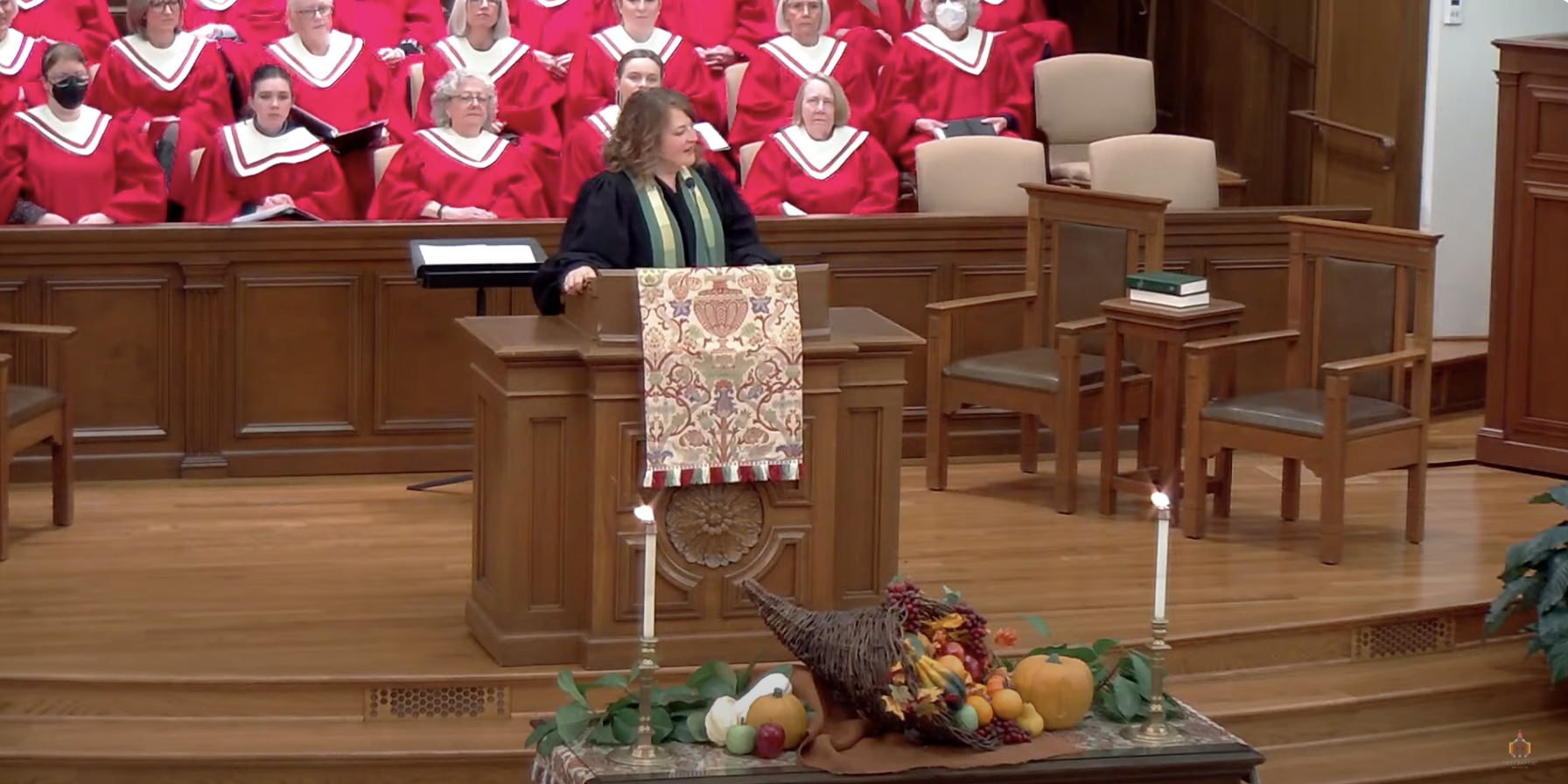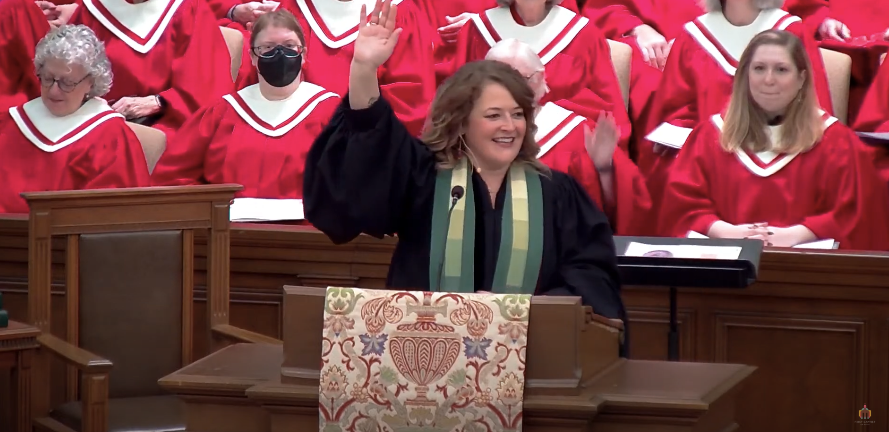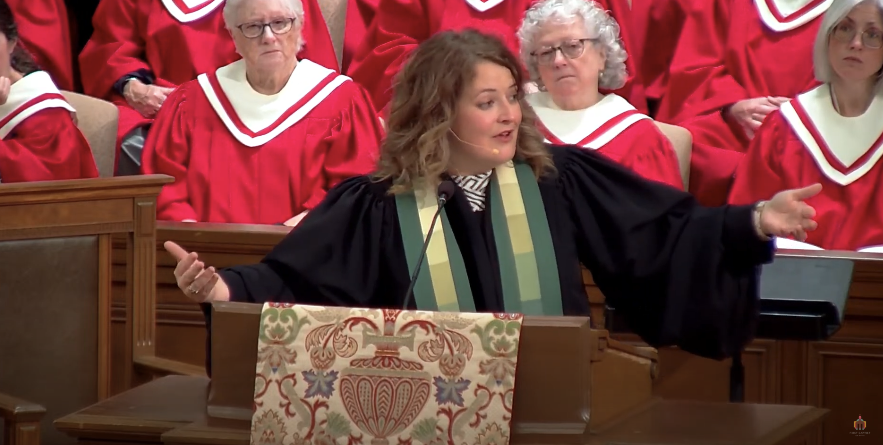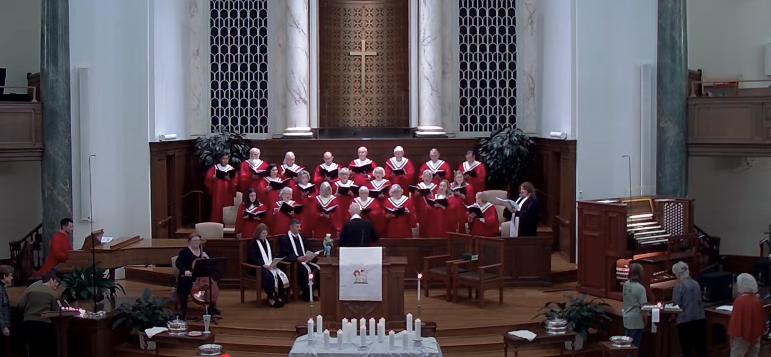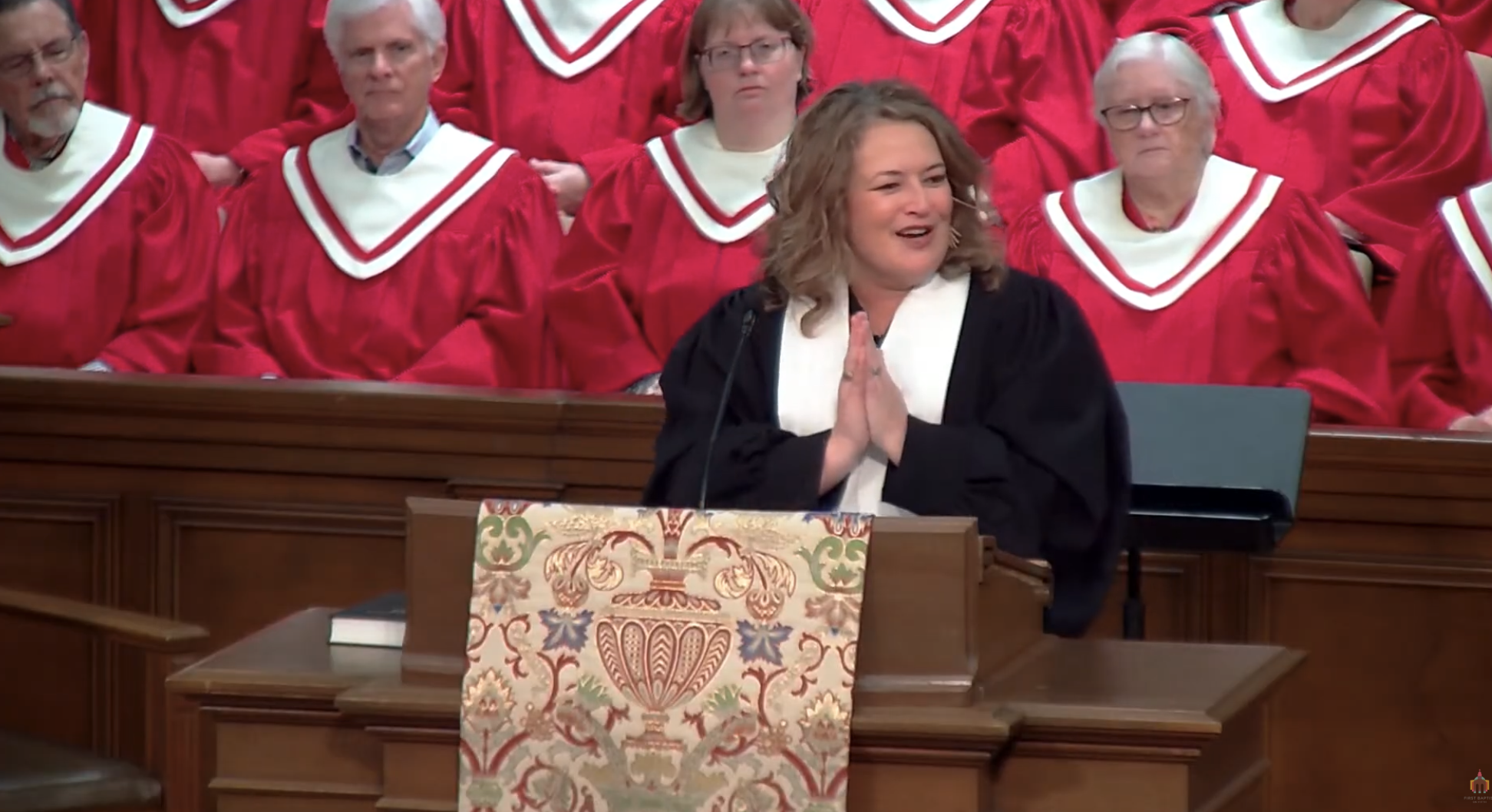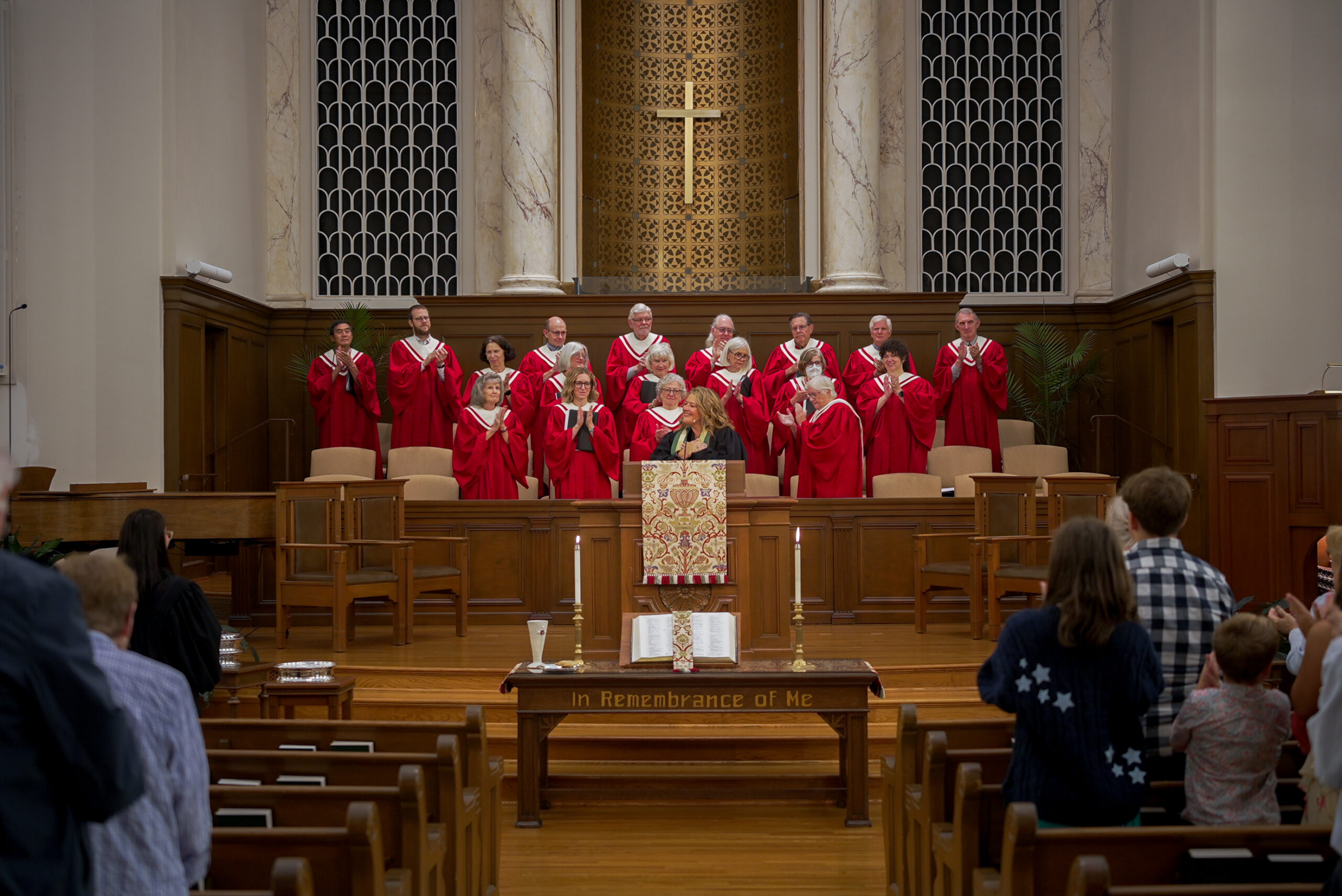I.The history of the Thanksgiving holiday is what you might call… complicated. It’s complicated like most human-declared events are, layered in different perspectives and laced with contradictory stories. Historians are split about where these Thanksgiving traditions began: was the first Thanksgiving meal in present-day Massachusetts in 1621 where pilgrims and their buckled hats and Native Americans dined together in celebration of the autumn harvest? Or was it an English celebration (different hats!) on the shores of Virginia, in 1619? Or how about a Spanish gathering in what became Texas, in 1598 — or Florida, in 1565?
Each of these dates in our country’s history have different commemorations tied to them. Those English colonists in Virginia declared the day in celebration of their arrival and gratitude to God for guiding them across the ocean safely. The Spanish explorers also thanked God for safety with their commemoration. But the Thanksgiving celebrations in Plymouth of 1637 were declared to be “in honor of the bloody victory” after Native Americans were massacred there. President George Washington declared a national holiday of Thanksgiving for citizens of the United States to thank God for the birth of a new nation, and President Abraham Lincoln set the “last Thursday in November” date for the holiday in 1863, explicitly tying it to the Union’s military efforts in the Civil War. And when President Franklin Delano Roosevelt tried to move the holiday up a week in 1939 in an attempt to spur on retail sales during the Great Depression, he was roundly condemned for his plan called “Franksgiving.” The holiday officially was moved back to it’s original place two years later… but don’t worry, Black Friday eventually caught up.1
So later this week when we crowd around tables perhaps heavy with turkey or tofurkey and all the fixings, we do so inheriting a complicated, morally flawed collection of stories, all which stumble toward a recognition of gratitude of all kinds: for good harvest, for safe passage, for colonial conquest, for military victory, for… shopping.2 To it, we may add our stories: of that time Uncle Jim tried out his new turkey fryer and caught it on fire, or that year we had the epic football game in mama’s backyard, or the last Thanksgiving with grandma in her spot at the table. But the origin stories of this national holiday and our experiences of it pale in comparison to the origin stories of humanity’s gratitude to God. And today, we hear that story through the voice of the prophet Joel.
II.Perhaps you’re like me and need a quick refresher on Joel. You may have slept since last you read it! Or if perhaps you’re like me and did Bible drill as a kid, Joel wasn’t much more than the second book in the list of the the twelve “minor prophets” of Hosea-Joel-Amos-Obadiah-Nahum-Habbakuk- Zephaniah-Haggai-Zechariah-Malachi! But Joel is distinct; there’s nothing minor about Joel’s words, timeless and true as they are. As the book begins, Joel speaks of a story to pass down. “Tell your children of it,” he says, “and let your children tell their children, and their children another generation.” What story?, we wonder. He tells of the story of a devastating crisis and its resolution, and of God who remained faithful to the people of Israel through it all. You see, that crisis was one of locusts – a plague, Joel calls them, those locusts who cut and swarm and hop and destroy and obliterate the people’s crops “like an attacking nation.” Because of this, there is no harvest. No wine. Starved animals. Empty granaries.
As Joel speaks of this crisis, of all that is ruined – the ground mourns, the grain is destroyed, the wine dries up, and so on – he says clearly, “surely, joy withers away among the people.” But throughout his prophetic word, Joel calls the people to prayer and fasting, to repentance and return, to weeping and mourning, to gathering and assembling – even the babies and the elders. These practices, you see, ground the people in their time of crisis, giving them a place for their grieving energies and an anchor for their hope.
And in our passage for today, Joel begins a series of three imperatives – do not fear! – where he identifies how God provides. “Do not fear, o land! Do not fear, you animals of the field. Be glad, o children of Zion! For the Lord has done great things.” Why? The pastures are green, the trees bear fruit, the vineyards give their yield, the rains are abundant, the threshing floors are full of grain, the vats overflow with wine and oil. You see, in God’s story, no crisis is without God’s presence. No tragedy without God’s intimacy. No story without God’s saving grace. This is where Joel really gets it right: for the story of thanksgiving begins with God.3 But where Joel gets it clear is the call for thanksgiving in all things, because he knows that gratitude when locusts are swarming and the walls are closing in is, well, hard to come by! “You shall know that I am in the midst of Israel,” God says through Joel, “and that I, the Lord, am your God and there is no other. My people shall never again be put to shame.”
III.Several years ago, I read Diana Butler Bass’s book called Grateful: The Transformative Power of Giving Thanks. I’ve returned to it a number of times since! But it was in her book where I learned about a concept that social psychologists call the ‘headwinds/tailwinds asymmetry’; that is, our ever-present tendency to focus far more on whatever obstacles or headwinds we face in our life, and to focus far less on the blessings or tailwinds we’ve been given to use. The headwinds are obvious places of resistance or struggle in our lives, literally the ‘wind in our faces.’ Tailwinds, on the other hand, are the opposite, literally the ‘wind at our backs,’ nearly invisible due to the long-assumed advantages they give us. It’s like what Walter Brueggemann once said: “We hardly notice our prosperity.”4 It’s probably no surprise that the bent of our human nature is towards that with which we struggle, that which is harder to overcome, that which provides a barrier or challenge to thriving in life. Too long a look at one’s headwinds can lead to bitterness about the struggle, resentment towards those in the path ahead, and envy towards another who doesn’t share in that struggle. In short, headwinds are barriers, tailwinds are blessings; “focusing on headwinds breeds bitterness,” she says, “but focusing on tailwinds breeds thanksgiving.”5
IV.We’ve spent these November weeks talking about when life together is hard, and yes, life together remains hard. I bet it would sound rather Pollyanna-ish of me to stand here and tell you to just share a meal with someone you have a hard time loving and focus on the tailwinds, lest you focus on the locusts! (Proverbially, of course.) We live in a headwind-heavy story, don’t we? I’m certain that every one of us here is painfully aware of the places of scarcity in our lives. It’s different for each of us of course, but maybe for you it looks like a mountain of debt you have in front of you and can hardly imagine scaling. Maybe it looks like the job that is stripping you of your integrity or your will to go on. Maybe it’s the one dream you had for your life that just isn’t within reach, or the broken relationship that feels like an open wound in your days. We live with profound suffering, with immeasurable grief, with grave injustice, with tragedy around every turn. In such a context, finding gratitude for simple moments of each day – the tailwinds of life – can feel perhaps whimsical or silly, or that somehow setting aside modern cynicism or anger or busyness for gratitude communicates ignorance or a naive view of the world where, as Frederick Buechner reminds us, “beautiful and terrible things will happen.”
But what if instead we took our cue from Joel? What if instead we told the tailwind story alongside the headwind story, the story of the times in our lives when God showed up in the hard, in the broken places, in the dark spots? What if we patterned our lives and relationships on Joel’s reminders: “do not fear!,” and “be satisfied”? What if we trained ourselves in the way of thanksgiving with grounding rhythms as Joel named, practices that root us in the story of thanksgiving that begins with God? What if these become the words we then share with each other? And not just shared with those who share our interests, our politics, our worldview, our values, but genuine thankfulness shared freely with our neighbors and our communities of all kinds.
V.That way of being of finding gratitude, not by overlooking the crisis but speaking thanksgiving into it – it takes some practice, and here’s where the church comes in. The word “gratitude” comes from the Latin gratia and the Greek charis – both translating as ‘grace’, all with roots in thanksgiving. Indeed, grace and gratitude are hallmarks of the Christian life, expressions of faith that knit us indelibly to God, giver of all good gifts, and to one another. Perhaps that’s why one of the central expressions of our life in community – the meal Christians share when we gather around the table – comes from the word eucharisteo, which translates to mean “thanks.” So we practice “in here” what we live “out there.” We tell a different story in here, so we can go tell it out there, all because the Christian life is a life lived in response to the grace God has given.
That grace is echoed in David Steindl-Rast’s word on gratitude, saying, “everything is a gift. The degree to which we are awake to this truth is a measure of our gratefulness, and gratefulness is a measure of our aliveness.” Indeed, true gratitude is free of trite platitudes or naive optimism. Gratitude doesn’t act as an antidote for all that grieves us, all the losses and fears and anxieties and heartbreaks and sufferings of our days. Rather, gratitude tethers. It links us – one to another, one to the earth, one to God – framing all the things of this world within the lens of gift. All of it. Gift upon gift, grace upon grace. Gratitude, when practiced on the regular, begets gratitude; meaning, the more you experience and express it, the more it grows! The English writer Samuel Johnson once said, “Gratitude is a fruit of great cultivation.” Paul links gratitude and joy as “fruits of the spirit.” And to that, Diana Butler Bass again adds: “Gratitude is not only an emotion; it is something we do. It is like tending a garden. It takes planting and watering and weeding. It takes time and attention. It takes learning. It takes routine. But, eventually, the ground yields, shoots come forth, and thanksgiving blooms.”
VI.So how do we tell that story and tend the gratitude garden? With practice. With intention. With joy. With each other. There’s lots of ideas for practicing thanksgiving, of course. You know this! You live this! Some of you create a gratitude journal. Others of you write thank you notes or send thank you texts. I just learned that a group of our members who volunteer at Dress for Success even played gratitude bingo this week, so you could do that! Some extend your gratitude for what you have by serving those who have not, and others make it as simple as pausing in your day to actually say out loud – to yourself or another – “I am so grateful for …” You may have even more ideas!
Here are a few ideas I love for this moment, all inspired by Joel.
TELL. Tell your children, your parents, your friends, your neighbors of a time when God was present during the worst thing. This remembering is vital, so that when each generation – individually or collectively – experiences a crisis of locust proportions, we can remember: God was present then, and God is present now.
RETURN. Just before our text for today begins, we read words of Joel often used on Ash Wednesday as we prepare for the season of Lent. “Return to the Lord with all your heart,” Joel says, “with fasting and weeping and mourning.” I’m reminded here that there’s nothing wrong with outward practices of thanksgiving, but they should be accompanied with inward work. Why? Because “God is gracious and merciful, slow to anger, abounding in steadfast love, and relenting from punishment.” When all is disorienting, God is a refuge. When the center does not hold, God is a fortress. When headwinds are heavy, God is a stronghold. When one world comes to an end, God’s new world is being born.
RECEIVE. Just after today’s passage ends, we hear words familiar to us from our Christian observance of Pentecost. “Then afterward,” God says, “I will pour out my spirit on all flesh. Your sons and your daughters shall prophesy, your old men shall dream dreams, and your young men shall see visions.” Meaning: God’s presence comes to all. God’s Spirit knows no boundaries. So receive it with joy and wonder and gratitude above all else.
GIVE THANKS. This one is rather obvious. I can’t help but to quote Anne Lamott who says this of gratitude: “Gratitude contains a heightened and amazed realization of how much goodness is marbled into our strange and sometimes hard, annoying lives. This catches us by surprise, as if we are children, and a sudden breeze is playing with our spirits, as if with paper planes, lifting us, restoring our sense of buoyancy, where before there was the opposite — the worried, the trudge, endless calculations and scheming, numbness. Gratitude tugs on our sleeves and says,”Wake up!” … Wow, you think: what’s the catch? No catch. No other shoe to drop. God only has one shoe.”6
Friends, this week and every week, I encourage us all to remember that Thanksgiving begins with God. Tell, return, receive, and give thanks in your living, this day and every day. This is the story of gift and grace, of hope in the midst of suffering, of the God who only has one shoe, and of Christ who makes all things new again. Thanks be to God!


